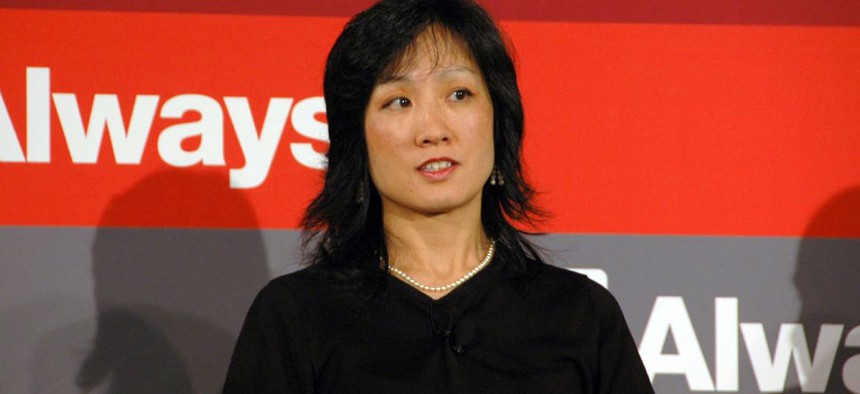When Washington Comes to SXSW: The New Head of the Patent Office on Creative Destruction

Flickr user Dan Farber
There are a lot of things you might imagine seeing at SXSW, but the swearing in of a top U.S. government official probably isn't one of them.
There are a lot of things you might imagine seeing at South by Southwest, Austin's annual festival of music, film, and emerging technology, but the swearing in of a top U.S. government official probably isn't one of them.
Nonetheless, this past March, in front of a cheering audience at the event, Michelle Lee, 49, officially became the first woman to head the U.S. Patent and Trademark Office. She was happy to forgo the usual, fusty, closed-door D.C. ceremony to be among the festival's inventors and creative disrupters, she told an interviewer at the time.
"I know the community. I love the community. I feel at home with the community," she said.
As the new director of the USPTO as well as the undersecretary of Commerce for intellectual property—which makes her the principal adviser to the president through the secretary of Commerce on domestic and certain international IP policy matters—Lee's job, as she sees it, is to "promote American innovation" by protecting intellectual property through the issuing of patents and registering of trademarks. It is work she views as inextricably linked to the creative minds at gatherings like SXSW.
"Our nation's continued economic success hinges upon technological innovation," she says. "It's one of the reasons we're as strong as we are now economically and globally."
At the top of her agenda is getting a meaningful piece of patent legislation passed by Congress. The Innovation Act, which passed the House last year and was recently reintroduced, would take steps to help increase transparency in the patent system and curtail abusive patent litigation. Other top priorities include reducing the backlog of unexamined patent applications (reported to be as many as 700,000 in 2009), as well as increasing the quality of the patents issued by USPTO.
Another major concern is making sure that the IP laws and remedies in foreign countries are strong enough for American exporters to feel comfortable selling their products overseas. This has Lee's office working closely with the U.S. trade representative, as well as traveling to meet with her counterparts around the world.
"It's a priority for the administration to increase trade," Lee explains, "and one of the ways to encourage trade is to make sure Americans have a level playing field."
Born and raised in Silicon Valley, Lee grew up surrounded by technology, innovation, and entrepreneurship. Her dad was an electrical engineer, and she fondly recalls building an amateur radio from a kit with him in their living room as a young girl. She studied electrical engineering and computer science at the Massachusetts Institute of Technology, and she worked at the MIT Computer Science and Artificial Intelligence Laboratory and Hewlett-Packard Research Laboratories as a computer programmer before enrolling in Stanford Law School.
"Going to MIT, I never thought I'd be a lawyer," Lee says.
But after stitting in on a class at Harvard Law School, she changed her mind. In an era when legal and copyright issues associated with the digital environment are a source of increasing concern, her background has proved extremely useful.
"When I first began the practice of law, patents were not [at] the front and center," she says. "Over time, people have realized the importance of IP."
Lee served as a law clerk in the federal judiciary before going on to represent high-tech start-up companies as a legal adviser and partner in a Silicon Valley-based law firm. For almost a decade, she was deputy general counsel for Google and the company's first head of patents and patent strategy. Then, she made the leap to government, serving as director of the USPTO's Silicon Valley satellite office.
"I had been a user of USPTO services for almost the entirety of my career," she says. "I saw how inventors, who would come up with an invention, would file a patent, would then use that patent to obtain venture-capital funding to start a company and build a company. I get the value of IP to our society."
She came to Washington and served as acting director of USPTO for a year before being confirmed as director.
During her time in California, Lee also cofounded, along with six other heads of patents and intellectual-property departments from major Silicon Valley tech companies, Chief IP Counsels (ChIPS), a nonprofit intended to encourage, promote, and retain women in the STEM fields.
"We realized we were in situations to help the women coming up behind us," she says.
Lee wants to see more women thinking about—and working to protect—intellectual property as well, and she's starting on them young. She has been working with the Girl Scouts on a patch—the traditional way of signaling a Girl Scout's prowess in a given area.
To earn an "IP Patch," girls must learn a little bit about copyrights, patents, and trademarks. Lee, who was herself a Brownie and then a Girl Scout Junior, calls the effort "one of the most rewarding things I've done." While the patch still isn't available nationally, it's something Lee and her partners at the organization are hoping to make happen.
"The patches I remember earning were on first aid and sewing," Lee says. "I think we can do better than that."





